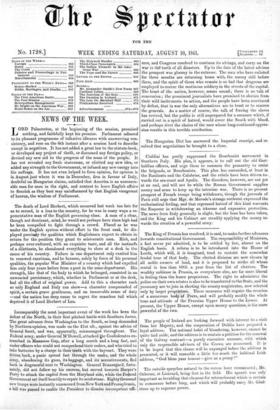The death of Lord Herbert, which occurred last week too
late for us to record, is a loss to the country, for he was in many ways a re- presentative man of the English governing class. A man of a clear, though not dominant, mind, he would not perhaps have risen high had he been compelled to fight through a crowd. Placed as he was under the English system without effort in the front rank, he dis- played precisely the qualities which Englishmen expect to obtain in return for the position they grant to aristocratic men. Rich, and perhaps over-cultured, with an exquisite taste, and all the instincts of a dilettante, he abandoned everything to slave at a desk in the cause of his country. Failure in one department only excited him to renewed exertions, and he became, solely by force of his personal qualities, the popular War Minister of a country which had expelled him only four years before from a post in the same department. His strength, like that of the body to which he belonged, consisted in an unwearied persistency, which, whether in Parliament or at the desk, had all the effect of original power. Add to this a character such as only England and Italy can show—a character compounded of spirit, a certain grave gentleness, and an immovable sense of duty —and the nation has deep cause to regret the ceaseless toil which deprived it of Lord Herbert of Lea.






























